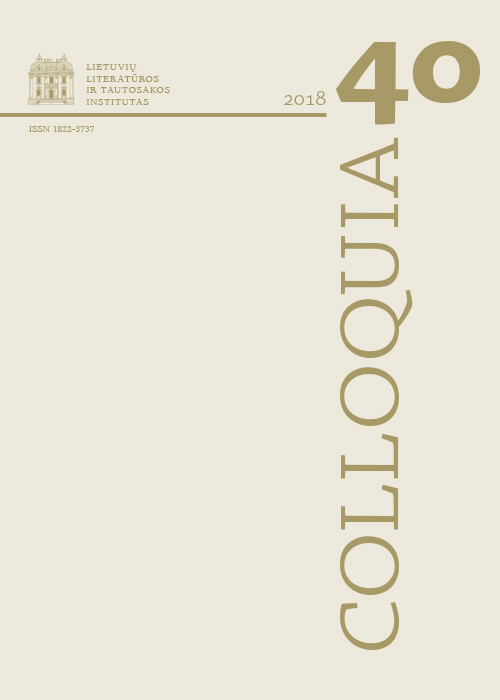Return to Our Times: Juozas Aputis’s Relevance “Then” and “Now”
Abstract
The author of this article uses narratological and semiotic analysis to conduct a new reading of Juozas Aputis’s classic stories, while at the same time engaging in a dialogue with interpreters who have used different methodologies. Having established that Aputis writes about fundamental existential matters, the author of the article discusses how his texts communicate experiences that cannot be contained by empirical reality – the unconscious reservoirs within human beings that occasionally distort our behavior and feelings. According to the narrated events, the narrator is not only an observer of action but also an engaged participant in it and one who always remains empathic toward oppressed characters and the world at large. This kind of empathy is further developed in the works of twentieth century Lithuanian prose classic Jonas Biliūnas. The author of the article argues that readers’ understanding of Aputis’s prose oscillates between the model of prose that promotes traditional rural values and more universal dimensions of expression.
Downloads
Most read articles in this journal
- Magdalena Garbacik-Balakowicz, Identity Politics and the Literary Canon: Sándor Márai’s Place in the Hungarian Literary Canon , Colloquia: Vol. 53 (2024): Colloquia
- Avner Holtzman , Vilna as a Centre of Hebrew Literature: The Journal Hazman , Colloquia: Vol. 48 (2021)
- Solveiga Daugirdaitė, Autobiography and Soviet Lithuanian Women Writers , Colloquia: Vol. 32 (2014)
- Inga Mitunevičiūtė, The Ecological Potential of Vytautas Petkevičius’s Didysis medžiotojas Mikas Pupkus (The Great Hunter Mikas Pupkus) , Colloquia: Vol. 35 (2015)
- Radvilė Račėnaitė, Foreword II , Colloquia: Vol. 48 (2021)
- Stasys Mostauskis, Lost in Memory , Colloquia: Vol. 43 (2019)
- Naglis Kardelis, Perceiving Vydūnas , Colloquia: Vol. 44 (2020)
- Erika Grigoravičienė, The Narrative of the Third Generation , Colloquia: Vol. 46 (2021)
- Algirdas Julius Greimas, Pranas Naujokaitis, Lithuanian Literature Juozas Girnius, “Returning to Žemė (Earth)” in Literatūros lankai (Literary Folios) , Colloquia: Vol. 39 (2017)
- Vytautas Rubavičius, Vytautas Kubilius: The Relevance of Soviet-Era Hermeneutics , Colloquia: Vol. 38 (2017)




